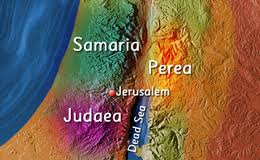
By NAFTALI BENNETT – Op Ed – The New York Times November 5, 2014
JERUSALEM — Recent events in the Middle East are a reminder of how the old models of peace between Israel and the Palestinians are no longer relevant.
The time has come to rethink the two-state solution.
This past summer, Hamas and its allies fired over 4,500 rockets and mortars at Israel, demonstrating once again what happens when we evacuate territory to the so-called 1967 lines and hand it over to our adversaries. Peace is not obtained. Rather, we are met by war and bloodshed.
The rise of the Islamic State, also known as ISIS, and other extreme elements in Iraq, Syria and Lebanon, make the risks just as clear. Israel cannot afford to gamble with its security. There are no second chances in the volatile Middle East.
That is why, for its security, Israel cannot withdraw from more territory and cannot allow for the establishment of a Palestinian state in the West Bank. If we were to pull out of the West Bank, the entire country would become a target for terrorists who would be able to set up rocket launchers adjacent to the Old City of Jerusalem and on the hills above the runways of Ben-Gurion International Airport and the Tel Aviv Stock Exchange.
Take the Jordan Valley. The Palestinians demand that Israel withdraw from this narrow piece of land, which borders Jordan. But if we do so in today’s climate, we potentially open the door for the Islamic State and other extremists to flood into the new Palestinian state. We cannot take that risk.
How do I know? Because it happened. Not once, not twice, but three times.
In the mid-1990s, we pulled out of Palestinian cities as part of the Oslo agreement. In 2000, the second intifada erupted and over 1,000 Israelis were killed in attacks carried out by terrorists, many of whom came from the very cities we had evacuated.
When we pulled out of Lebanon in 2000, we saw a significant strengthening of Hezbollah, the Iranian-backed militia. During the second Lebanon war six years later, Hezbollah fired more than 4,300 rockets at our cities.
And in 2005, we withdrew from the Gaza Strip and handed it over to the Palestinian Authority. We were told that Gaza would turn into the Singapore of the Middle East and that peace would grow out of the greenhouses the Jewish residents had left behind.
Instead, those greenhouses were used to cover up terrorists’ tunnels dug across the border into Israeli towns and villages. Gaza quickly turned into a fortress of terror.
But this does not mean all hope is lost. There is still much we can do to improve ties with our Arab neighbors, to generate peace and to cultivate economic prosperity for all people who live in this land.
The secret is bottom-up peace. After more than two decades of working on a single solution for the Israeli-Palestinian conflict — the establishment of a Palestinian state — it is time to realize that coexistence and peaceful relations will not be obtained through artificial processes imposed on us from above. Instead, I propose a four-step plan.
First, we would work to upgrade the Palestinian autonomy in the West Bank, in the areas largely under Palestinian control (known as Areas A and B, according to the Oslo Accords). Ideally, this will be done in coordination with the Palestinian Authority.
The Palestinians will have political independence, hold their own elections, select their own leadership, run their own schools, maintain their own social services and issue their own building permits. They should govern themselves and run their day-to-day lives. Israel should not interfere. Much of this already exists, but we can do better.
This Palestinian entity will be short of a state. It will not control its own borders and will not be allowed to have a military.
Gaza already functions like a state, but the Hamas government in control there is bent on Israel’s destruction. As long as Gaza remains on this path, it cannot be a party to any agreement.
The second step will see the massive upgrade of roads and infrastructure, as well as the removal of roadblocks and checkpoints throughout the West Bank.
The objective will be to ensure freedom of movement for all residents — Palestinian and Israeli — and to improve their quality of life.
No peace, though, can last without economic viability. So the third step will be to build economic bridges of peace between Israelis and Palestinians.
In my former career as a high-tech entrepreneur, I saw how diverse people from different backgrounds could learn to work together in pursuit of economic prosperity. Already, there are 15 industrial zones in the West Bank where Israelis work alongside about 15,000 Palestinians. These zones pump about $300 million a year into the Palestinian economy. Imagine what another
15 industrial zones could do.
Lastly, I propose applying Israeli law in Area C, which is the part of the West Bank controlled by Israel under the Oslo agreement. The Palestinians who live there would be offered full Israeli citizenship. We can start with the known settlement blocs that everyone agrees will remain part of Israel even under a final status agreement. By applying Israeli law and asserting national sovereignty in those blocs, while upgrading Palestinian autonomy in Areas A and B, we will reduce the scope of territory in dispute, making it easier to reach a long-term agreement in the future.
I am aware that the world will not immediately accept this proposal. It seems to go against everything Israel, the Palestinians and the international community have worked toward over the last 20 years. But I will work to make this plan government policy because there is a new reality in the Middle East, which has brought an end to the viability of the Oslo peace process.
The regional upheaval and disintegration of nation states oblige us to act responsibly. We must work toward realistic goals that are capable of providing real security and economic prosperity.
==================
Naftali Bennett is Israel’s minister of the economy and the leader of the Jewish Home Party.
________________________________________
IMRA – Independent Media Review and Analysis
